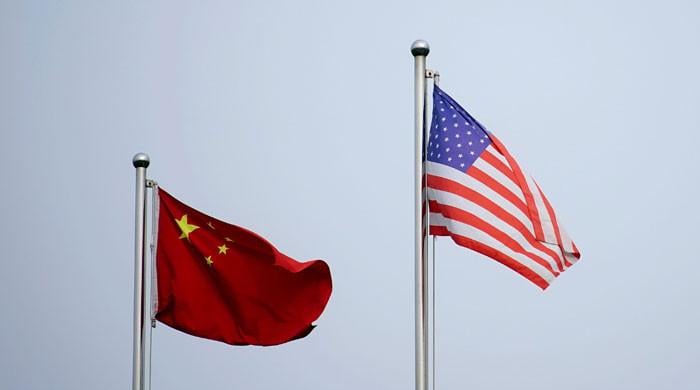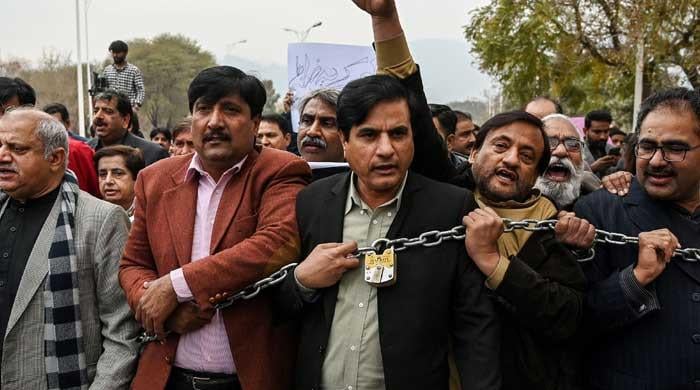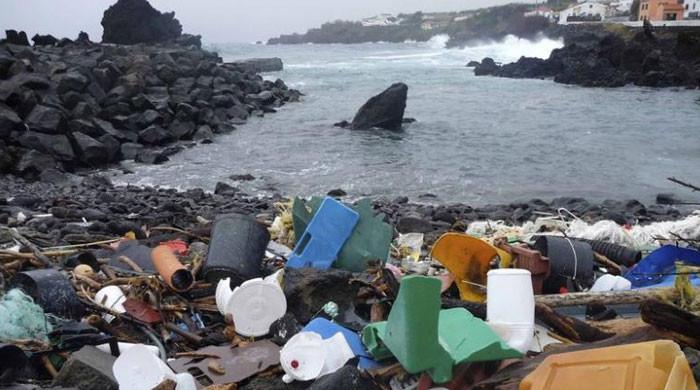Seven deadly sins of Pakistan's economic managers
Economic managers sometimes fully neglect to reveal true nature of IMF red lines, realistic timelines and our commitments
March 04, 2023

In the 1960s, Pakistan produced globally renowned prototypes for economic development. South Korea is said to have leveraged them to engineer their historic economic takeoff. In Pakistan, regrettably, these prototypes were cast aside, gathering dust on proverbial shelves. Today, six decades later, having watched country after country taking off in our neighbourhood, we are once again attempting to engineer sustained and inclusive growth. We have all manner of sensible advice to assist us, some homegrown and others shared with us by donors based on international best practices. And yet, we are unable to act upon this advice. Instead, we remain mired in a vicious cycle of boom and bust. This article attempts to look under the hood of the policy-making apparatus in Pakistan. It asks why we are continually unable to enact reforms and implement good policies, even though we broadly know what to do.
Fifty years ago, the young Chief Economist of Pakistan's Planning Commission, Mahbub ul Haq, wrote about the seven sins of economic planners in the Global South. He identified them as: fascination with numbers; love for excessive controls; preoccupation with investment levels; addiction to development fashions; divorce between planning and implementation; economic growth without justice; and neglect of human resources. Fifty years on, some of these ailments persist in Pakistan and others have metastasised with the times.
With apologies to Mahbub, who was my first boss and left an indelible mark on my intellectual evolution, I will attempt to update this list of transgressions. I think these modern-day sins go a long way towards explaining why we are unable to implement serious reform in Pakistan. The list is based on my personal experiences as a policymaker at the State Bank of Pakistan over the last three years.
The first and most serious sin that our economic managers are guilty of is a "fetish for growth" at any cost. Perhaps this is a reflection of short political cycles, but the ultimate thrill for our policymakers is a stimulus-fuelled growth spree. Such growth is promoted by the usual lobbyists and powered by the seductive snake oil that growth will conquer all our problems. Given the consumption and import-centric model of growth that Pakistan has fallen into, such adventures invariably end in tears as a burgeoning current account deficit depletes foreign exchange reserves and sends us back to the IMF time and time again. We have played this game so many times — 23 times and counting — that it is scarcely believable that anyone falls for it anymore. But somehow, we do. Perhaps it is because the macroeconomic linkages between fiscal and monetary stimulus, the current account and foreign exchange reserves are not fully understood by our policymakers. In other countries I worked on in my previous life at the IMF, fiscal councils, fiscal rules, private think tanks and independent central banks help to constrain bad budgets and prevent boom busts.
The second deadly sin of our economic managers is "myopia". Unfortunately, Pakistan has lurched from crisis to crisis in the last quarter century. As a result, firefighting uses up a lot of the bandwidth of our key economic ministries on a day-to-day basis, leaving very little space for long-term planning. This is a key deficiency as it never allows us to focus on the difficult structural reforms that are key to altering our model of growth and putting the economy on a sustainable footing. In other countries, ministries of planning and separate units within ministries are tasked with such longer-term planning and shielded from day-to-day matters.
The third, related sin, is "weak preparation". Given that none of our major political parties has an economic think tank or a tradition of a shadow cabinet, and given the successive hollowing out of talent from our key ministries, new governments are caught off guard when they come to power. They often complain that they were not aware of the extent of the economic difficulties. They have no blueprint for macroeconomic management and structural reform that they can fall back on to hit the ground running. As a result, precious time is lost dithering at a time when buffers are typically already weak and things are allowed to drift, resulting in damaging delays in approaching the IMF or completing ongoing IMF reviews on time. Similarly, when it is time to negotiate with the IMF, weak preparation leads to drawn-out and one-sided discussions, as well as an inability to present a coherent homegrown macroeconomic diagnosis or credible alternatives to the policies being recommended by the IMF. In other countries I worked on in my past life, the government is much better prepared for IMF discussions, including by responding to data requests and initial questionnaires before formal discussions begin so that less time is wasted on basic information gathering and policy issues are given more air time.
The fourth sin, which was also on Mahbub's original list, is "love of controls". By nature, our economic managers are suspicious of market signals and believe instead in controlling prices and quantities. This is reflected, for instance, in badly thought-through support prices for agriculture, credit quotas for various sectors, arbitrary clampdowns on imports, and an obsession with keeping the exchange rate strong. On the exchange rate, even though Pakistan has moved from a fixed to a flexible exchange rate recently, the obsession for supporting the Rupee continues, despite its well-known harmful effects in terms of subsidising imports, penalising exports and burning foreign exchange reserves. Unfortunately, it is still not in the DNA of our policymakers to trust price signals and respect budget constraints, even though the economy has become much more difficult to directly control as its size and complexity have grown exponentially in the last few decades. Other countries have learnt to let go and harness market signals to promote rapid growth and resource re-allocation, while of course stepping in every now and then when there are significant market failures.
"Lack of experimentation and evaluation" is the fifth fatal sin of economic managers in Pakistan. Substantive decisions with long-lasting consequences are often made in a hurry, without proper consultation. In particular, even an important apex body like the ECC, often serves as no more than a rubber stamp, with summaries presented at the last minute under the threat of impending legal action should they be delayed. The important oversight roles of public consultation and parliamentary deliberation have been significantly eroded, partly due to a lack of technical expertise and sometimes due to tight time pressure to meet IMF conditionality. At the same time, policy decisions are seldom subject to evaluation and the same old policies — such as generous subsidies to select sectors like textiles and real estate amnesties — are repeated over and over again with questionable results at best. This is unfortunate. In other countries, deliberation based on hard data and careful evaluation studies, often with the help of academia, is a critical component in formulating and refining public policy. Any subsidies are typically targeted and tied to monitorable performance targets, such as an increase in exports or employment.
The sixth deadly sin is "self-absorption". In the last quarter century, partly due to Pakistan’s increasing global isolation following the war on terror, our economic managers have lost their outward orientation and their desire to learn from the experience of other countries. This is hugely detrimental and in stark contrast to the habits of successful countries like Japan, which modelled its seminal Meiji era reforms on Western laws and the German civil service; China, which learnt about trade and FDI from Malaysia, Singapore, and Thailand; and India, which sent its key economic managers abroad to learn the art of negotiating with foreign investors and integrating with global supply chains. At the same time, this isolation has also bred a fantastical belief in our managers and the public alike that the normal laws of economics — such as the need to maintain positive real interest rate, mobilise tax revenue, ensure fiscal discipline, encourage savings, avoid over-consumption, and deploy capital away from real estate toward investment and productivity-enhancing sectors like exports — do not apply to Pakistan and that we are somehow an exceptional country that can march to the beat of its own drum. This is of course hugely mistaken and the consequences of this insular thinking are painfully plain for all to see.
The seventh and final sin that prevents good economic policies from being implemented is a "schizophrenic relationship with the IMF". On the one hand, the safety blanket of an IMF program represents a form of moral hazard that allows Pakistan’s elite to eschew painful reforms and fiscal discipline in return for increasingly frequent bailouts. On the other, Fund programs are often vilified in Pakistan for being unrealistic, too hasty and divorced from ground realities, both in terms of the austerity that they impose to stabilise the economy and, more damagingly, their cookie-cutter and unimaginative approach to growth-enhancing structural reforms. A related problem is that economic managers sometimes neglect to fully reveal to politicians (notably the Finance Minister and Prime Minister) the true nature of the IMF discussions, including the Fund’s red lines, realistic timelines and the commitments that we sign. This means that the government is often not able to be transparent with the public, missing the chance to build consensus for the difficult measures that a Fund program necessitates. This always leaves IMF programs on a tenuous footing, with each review dragging on and going down to the wire, by which time buffers are further depleted and the necessary adjustments become even more painful.
So there you have it. Together, I believe that these seven deadly sins militate against good economic policy choices in Pakistan and perpetuate a culture of unaccountable mistakes, from which no lessons are drawn. These sins must be overcome if Pakistan is to emerge from its long economic stagnation and join other countries in the region on the path of vitality and optimism. I am convinced that expunging these sins is a necessary condition for our economic revival. It would be an important beginning in our long and elusive quest to achieve our economic potential.
The writer is former deputy governor of the State Bank of Pakistan. He tweets @MURTAZAHSYED
Disclaimer: The viewpoints expressed in this piece are the writer's own and don't necessarily reflect Geo.tv's editorial policy.
Originally published in The News











